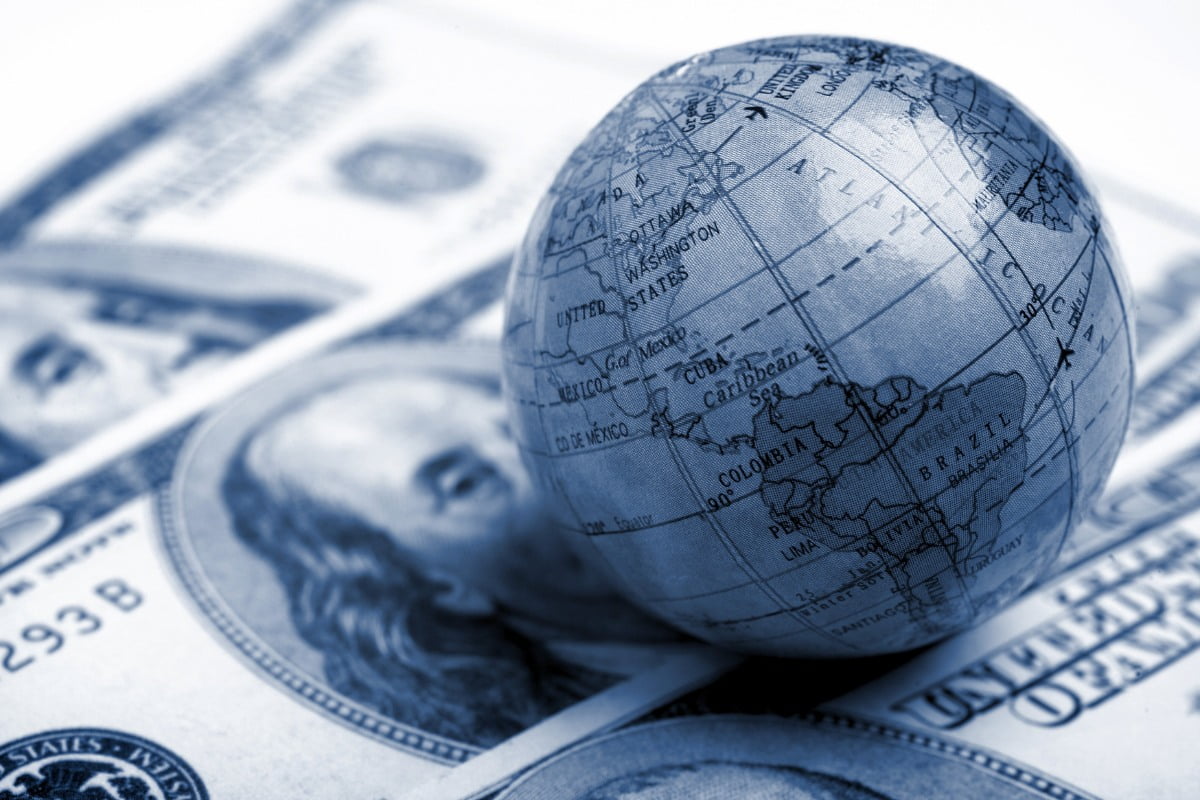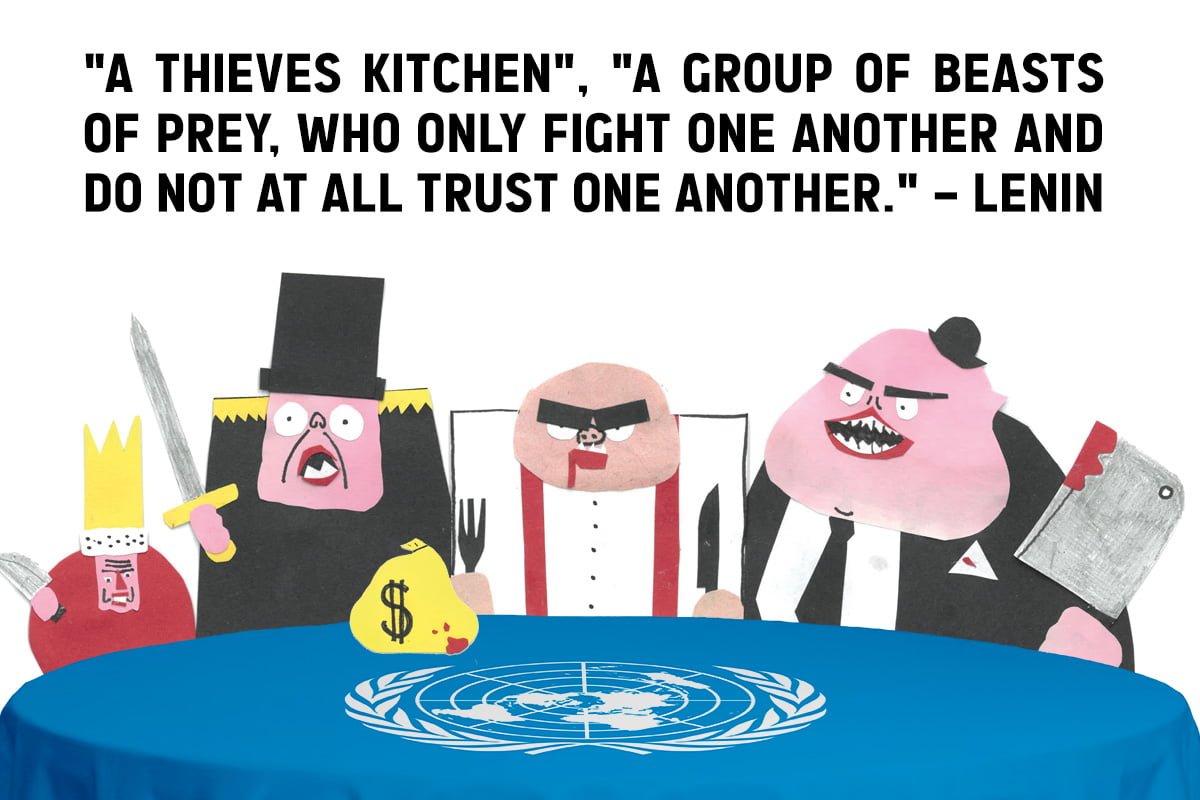The epoch of world growth fuelled by globalisation is over. Two giant free trade deals are being thrashed out which would place the United States at the centre of its own strategically drawn up domain, stretching from both sides of the pacific to Eastern Europe. But far from being a means to open up the world to a further intensification of trade and to liberate capitalism from its own fetters, these deals engineered by US imperialism in its own interests would carve up the world into two or more power blocs waging economic war with one another. It is protectionism masquerading as free trade.
Two sides of the same capitalist coin
Free trade and protectionism are not mutually exclusive opposites, but are two sides of the same capitalist coin, indispensable policies in its war for profit. The US likes to preach against the Chinese state’s protection of its own capitalism, just as Britain did to Europe 150 years ago, but in their day both America and Britain applied state protection to build up their own capitalism to the point where it could dominate others without help. Protectionism was, and is, used to create an internal free market, i.e. one free from ‘unfair’ international competition, and likewise free-trade is today imposed onto weaker countries to ‘protect’ American and European firms from ‘unfair’ Chinese competition. The two policies condition and turn into one another.
The complexity of capitalism’s contradictions mean that it can never attain a position of international harmony. Its uneven world development and inevitable political complications mean that periods of free trade and relative stability are only ever the preludes to new periods of instability and protectionism. Quite clearly, the enormous development of world trade has benefitted China, which has been an integral part of this process. But precisely because of this growth through globalisation, the size of China’s economy is now sufficient to begin to challenge US hegemony, especially if we take into account its political independence from the US thanks to its history of revolution, which freed the Chinese state from its previous imperialist subjugation. In this way a period of growth and stability has produced new protectionism and instability.
Globalisation and the World Trade Organisation
The two decades following the collapse of Stalinism were characterised by globalisation encapsulated by the World Trade Organisation (WTO) under US dominance. This genuine expansion and opening up of the world market was more or less inclusive of all major economies because none of them represented a threat to Western dominance.
The fading of the WTO into relative insignificance and the concurrent emergence of exclusive trade deals such as the two big ones in the offing, the Trans-Pacific-Partnership (TPP) and the Transatlantic Trade and Investment Partnership (TTIP), indicates that we have moved into a more protectionist epoch where “huge trading blocs act as new barriers to world trade” (Alan Woods, The Socialist Alternative to the EU).
From only the most cursory analysis of the big trade deals the US is currently pushing it is clear that the they are far more political than economic. The EU itself is essentially a glorified free-trade zone established largely to enable Germany, and to a lesser extent France, to inflate their economic and political clout on the world-stage in competition with the much larger USA. This was achieved using the weaker European states to greatly enlarge the economic and political significance of the region under Germany’s and France’s effective leadership, giving them larger markets to dominate and a claim to being world leaders.
Europe and The European Union
It is therefore deeply ironic that the much enfeebled EU is now forced to play the role of the weak state being used in the geopolitical games of the more powerful. The TTIP, the planned free trade deal between the EU and the US, would see European capital wedded to that of the US in a common bloc against China and Russia, and is therefore a tacit admission of the EU’s failure to become a powerful counterweight to US imperialism. The Eurozone crisis and the resulting diminished state of European power have already resulted in political and military defeat in Crimea. With this humbling Western Europe huddles behind American muscle, like a small child hiding behind its parents legs.
But the tendency for the EU to give up pretensions to competing with the US is older than this recent event, which only revealed the crumbling edifice more clearly. Crisis ridden Europe, embarking on a fearful journey of austerity, knows that China’s productive boom and low wages spells the end of ‘civilised, welfare state’ Europe. In the past 20 years, the EU’s share of world trade has fallen from 45% to around 34%, and will only decline further. Last year the EU got a nasty shock from China after it slapped a large tariff on Chinese solar panel exports. China threatened a trade war by symbolically putting tariffs on European wine exports, and stating in a People’s Daily editorial that the EU must recognise its declining power and sort out its complex and inefficient policy making procedures. Since then, China has chosen to ignore the EU and deal with individual European governments instead. Europe’s capitalists look at China’s centralised totalitarian state with envy, and at their own feuding governments and (remaining) workers’ rights with disgust.
It is for these reasons that European leaders are seriously considering abolishing all tariff barriers to US goods and services and massively curtailing their own right to regulate giant US corporations, as the TTIP stipulates (more on this later). They do not do so in the hope of creating wealth and jobs for their own citizens – EU tariffs on US goods and services are already very low at 3%, and it is estimated that implementing the TTIP would at best increase EU economies by 0.5% over ten years! Instead, EU leaders see no alternative but to club together with the more militarily powerful and politically unified US in order to negotiate the choppy waters of a “pacific century” more successfully. From the economic point of view, as we shall explain shortly, they also wish to use the TTIP not so much as a source of general growth but as legal cover in their austerity drive against the working class as they try to make European labour as ‘efficient’ as Chinese.
US imperialism and The Trans-Pacific Parnership
The TPP is arguably even more geopolitically driven and important than is the TTIP. Entirely a Washington initiative, it is anything but a neutral and innocent attempt to knock down international barriers, because it is in every respect designed to target and inhibit China on the US’ terms. The deal is being negotiated between 12 countries on either side of the Pacific Ocean in an apparent effort to liberalise and increase trade in the area which is clearly becoming the centre of gravity for world capitalism. Since it is obvious to everyone that a key reason for this region’s importance is China’s becoming the number one trader in goods in the world, it would seem strange that it has been left off this list of 12 negotiating states.
But strange it is not, because the aim of the deal is to contain China’s rise to the benefit of the US. America has already secured the alliance of most countries in the region, like Japan and South Korea, through essentially military conquests long ago, and its dominant navy secures the trade routes of the ocean. It is now using this political hegemony to engineer a deal perfectly designed to guarantee it leadership at the expense of China – just as the region grows largely thanks to China itself! David Pilling in the Financial Times points out that “under the TPP, tariffs on garments produced in, say, Vietnam and shipped to the US would fall to zero. That would be a potentially huge boost to Vietnam’s already sizeable garment industry. Yet to qualify, fabric such as cotton would have to come from a TPP country, most likely the US. At the moment, of course, much of the cotton for Vietnam’s huge garment industry comes from China.”
According to Jane Kelsey in Global Research, “At the TPPA leaders’ meeting Obama had talked about establishing international norms that would ‘be good for the United States, good for Asia, good for the international trading system – good for any country in dealing with issues like innovation and the discipline of state-owned enterprises (SOEs), creating a competitive and level playing field’. Above all, the TPPA would create international norms that would be good for resurrecting US strategic and economic hegemony.” She also points out that Mitt Romney “endorsed the TPPA as a ‘dramatic geopolitical and economic bulwark against China’” and that Obama in response said that “we’re organising trade relations with countries other than China so that China starts feeling more pressure about meeting basic international standards. That’s the kind of leadership we’ve shown in the region. That’s the kind of leadership that we’ll continue to show.”
This makes it clear that the political nature of the TPP derives from the interests of US imperialism against those of China, and that all the other countries are so much short change in this struggle. If the US government is so concerned about the principle of free trade, why does it invite Vietnam to participate in this deal, when it is no less protectionist and ‘statist’ than is China? It is because Vietnam is a useful and pliant tool against China, and affords an opportunity for engineering the situation so that it is obliged to buy cotton off the US instead of China, as mentioned above. Incidentally, the ‘Rules of Origin’, which stipulate that for an export to another TPP country to be tariff free it must be composed of materials also from within the TPP, is itself an anti-free trade rule of the TPP deliberately inserted to benefit the US as the largest economy in the deal.
China and The Regional Comprehensive Economic Partnership
Obviously any free-trade bloc which excludes China from it will tend to inhibit Chinese growth, which is export heavy. This further shows that the TPP is a protectionist measure which depresses economic growth. China’s inevitable counter attack will only increase the division of the world economy into competing blocs, which again will act to throw globalisation into reverse. Indeed China is leading negotiations for a rival free-trade bloc, the Regional Comprehensive Economic Partnership (RCEP), which mostly includes the same countries as the TPP plus China and India but excluding the US.
The terms of the RCEP are almost identical to those of the TPP, except they are more tolerant of the peculiarities of each country’s economy; in other words, it is a less crudely imperialist treaty than TPP is, reflecting China’s relative diplomatic weakness – the same phenomenon is also revealed in China’s famous policy of non-interference in the internal politics of countries with which it trades. China is trying to gain world influence by being ‘nicer’ to the ruling classes of the world.
The fact that seven countries are included in the proposed memberships of both the TPP and the RCEP reveals the overlap of imperial ambitions and the mutually incompatibility growth of Chinese imperialism with the maintenance of American imperialism. A ‘Free Trade world’ cannot be stitched together by uniting these contradictory treaties. Clearly a struggle over spheres of influence is brewing. Already New Zealand has said it will pull out of the TPP if it is “used as a vehicle to try to contain the rise of China”.
International class warfare
The watchword for Washington’s two big strategic trade deals is to attack not only China but the worldwide working class as well. It is an offensive on behalf of the vast US monopolies to steamroll any opposition to markets and profits throughout the world, and such opposition comes not just from China but from organised labour too. In this respect it is again more political than economic – the free trade deal Barack Obama signed with South Korea did not lead to general economic growth and jobs, but in fact is estimated to have led to 40,000 job losses. It is class warfare on an international scale. More important than the lowering of tariff barriers, which are not what is holding capitalism back, are the political rules integral to these treaties which are an assault on workers’ rights and anything else which might hold back profits.
The fact that the TPP and TTIP have near identical stipulations designed to empower multinational corporations against the legislation of any government within these treaties reveals something of the strategic thinking of the imperialist bourgeoisie. Marxists have always pointed out that reforms won for the working class under capitalism are never permanent guarantees, but represent only temporary truces in the ongoing class struggle. Only abolishing capitalism will end the attacks on the working class. 30 years of Thatcherite privatisation and deregulation, and even the past few years unprecedented austerity, are not enough. Now the imperialist governments of the West are trying via the backdoor to bind themselves into treaties which would overrule whatever legislation and regulation they happen to still have against untrammelled profiteering.
The spectacle of governments voluntarily straight-jacketing their own power and consciously inviting lawsuits against themselves from big business is the clearest proof one could imagine of their nakedly bourgeois character. It is in foreign policy and especially trade that the state’s role as the executive committee of the bourgeoisie is most obvious.
Behind closed doors
It is difficult to say anything about the detail of the TPP and TTIP, because they are being negotiated in secret. Even the respective parliaments of the negotiating nations are kept in the dark. The US Senator Ron Wyden has complained that the “majority of Congress is being kept in the dark as to the substance of the TPP negotiations, while representatives of U.S. corporations—like Halliburton, Chevron, PHRMA, Comcast, and the Motion Picture Association of America—are being consulted and made privy to details of the agreement…More than two months after receiving the proper security credentials, my staff is still barred from viewing the details of the proposals that USTR is advancing.”
According to George Monbiot, the major corporations of the US and EU have boasted of being able to co-write the TTIP with the European Commission, which latter “has held eight meetings on the issue with civil society groups [things like trade unions], and 119 with corporations and their lobbyists. Unlike the civil society meetings, these have taken place behind closed doors and have not been disclosed online.”
One thing that is known about the terms of the TPP and the TTIP are the scandalous ‘Investor State Dispute Settlement’ (ISDS) mechanisms built into both. According to Wikipedia, this “enables private firms a right of litigation against the laws and regulations of the various States [signed up to the free trade treaty], whenever these firms feel that these laws and regulations represent unnecessary [for capitalists regulation is always unnecessary!] obstacles to trade, access to public markets, investment and service-providing activities. This litigation will no longer be enacted through national jurisdictions, but through private arbitration structures” (our emphasis).
Dominance of the world market
In other words, ISDS represents a self-imposed attack on sovereignty by the bourgeois governments involved, and is proof that in our epoch of imperialist monopoly capital, the world market dominates everything. Democratically produced legislation, possibly won by the labour movement through struggle, can simply be overruled by the signing of an international treaty from which parliament and trade unions were kept entirely in the dark. The litigation brought by a company onto a particular government for simply acting in accordance with its own law is arbitrated in private and there is no right of appeal. Martin Khor in Global Research points out that “a few lawyers monopolise the international investment arbitration business; they act as lawyers in one case and as arbitrators in other cases. In a few cases, an arbitrator was on the board of directors of the parent company of the investor that took up the case” (our emphasis).
The same author adds that “If the payment is not made [after a successful suing], the award can potentially be enforced through the seizure of assets of the government that has been sued, or through tariffs raised on the country’s exports.” Naturally, such powers will be to the benefit of only a handful of giant multinational corporations with the power to bully whole governments and pay for influential lawyers. Thus this mechanism will aid the further concentration of capital on a global scale by enabling them to transcend the laws, regulations and tariffs of nation states.
There are many examples of this already happening where ISDS rules have been written into existing treaties. According to Médecins Sans Frontières “US pharmaceutical company Eli Lilly, for example, has sued the Canadian government through the ISDS provisions in Nafta for invalidating one of its drug patents, even though the patent did not live up to the criteria for patentability that Canadian legislation is entitled to require.” Friends of the Earth highlight that “Based on chapter 11 of Nafta, Canada is being asked for US$250m by US company Lone Pine Resources after introducing a precautionary moratorium on fracking.”
The International Centre for Settlement of Investment Disputes awarded $2.3bn to a US oil company against Ecuador. “American company Renco sued Peru for $800 million because its contract was not extended after the company’s operations caused massive environmental and health damage…Other recent investor-state dispute cases include one taken against South Africa by a European mining company claiming losses from the government’s black empowerment programme, and a $2 billion claim against Indonesia by a UK-based oil company after its contract was cancelled because it was not in line with the law” (Martin Khor, Global Research).
These examples all show the very real effects of such treaties, and it is notable that in the majority of examples it is US companies that are suing foreign governments. However we should point out that it is by no means guaranteed that either the TPP or TTIP treaties will be signed as there are so many conflicting interests to appease – New Zealand’s threat to leave the TPP should it be used against China is one example, but in the past few days Germany has also said it does not wish to sign up to the TTIP should it include ISDS stipulations. This may or may not have something to do with the fact that the German government is currently on the wrong end of litigation from Swedish energy company Vattenfall under the terms of the Energy Charter Treaty because of the government’s decision to phase out nuclear power.
The weakness and decline of Western imperialism
Whether the deals go ahead is not so much the point. What these two treaties reveal is the strategic interests of Western imperialism. If they fail to act on these as they plan to, this only reveals the inner weakness of said imperialism. It is clear that in their efforts to contain China, the Western imperialists are fighting their own decline.
But the ISDS plans also reveal not strength but weakness. In their desperation for investment, the nation states are willing to negate their own laws. What does that say about the confidence and health of the investors themselves? They only feel strong enough to invest when given guarantees that they can ignore regulation and legislation.
What appears to be an all powerful class of monopoly capitalists is in reality a feeble class. It is so jealous of its privileges that it demands cast iron guarantees against the law simply in order to perform the function – productive investment – that is supposed to justify its existence. ISDS is being pushed because they look at the turmoil in the world economy, especially in Europe, and worry that a left, or ‘populist’ in their language, government might be elected and regulate or even nationalise property. They have had their fingers burnt with Hugo Chavez and Cristina Kirchner’s nationalisations. They want to tie up the governments of the world in treaties which forbid such behaviour in advance.
Many on the left in criticising ISDS make the mistake of idealising a mythic past before ‘neoliberalism’ when we had genuine, democratic governments, and that we must defend our cherished parliaments against this neoliberal attack! But what the epoch of ‘neoliberalism’ proves is that diseased, senile capitalism can only survive through privatisations, deregulation and easy money. Far from being ‘freed’ from the state, frail capitalism leans upon it for support and bailouts, arrogating to itself impunity from the law and the rights of the working class.
The working classes of the world have a common interest in fighting against these treaties, all of which are aimed against their ability to defend themselves. But such a struggle reveals the impossibility of fighting on a national, reformist basis. A left government under capitalism must still function in accordance with the laws of capitalism – which demand deregulation for investment. Against international free trade treaties of the imperialist bourgeoisie we can only fight for a worldwide federation of socialist economies planning investment to meet the world’s needs, not the profit of a minute handful of billionaires.






